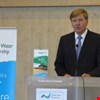


The Global Water Partnership and the African Ministers Council on Water (AMCOW) launched a joint programme to support water and climate change adaptation in Africa.

 The twin engines of urbanisation and resource depletion will undermine efforts to achieve water security: water availability will be eroded and conflicts will escalate. The assumptions underlying conventional urban water management must be revisited.
The twin engines of urbanisation and resource depletion will undermine efforts to achieve water security: water availability will be eroded and conflicts will escalate. The assumptions underlying conventional urban water management must be revisited.
 Social equity is the least understood of the 3 E’s (equity, economic efficiency and environmental sustainability) in the concept of integrated water resources management. This new Global Water Partnership Technical Committee Background Paper No. 15, “Social Equity and Integrated Water Resources Management”, sets out an overarching framework for the analysis of equity in the context of water development and management. It is intended as an aid to decision makers in designing policies, interventions, and programs aimed at the equitable distribution of benefits from water resources.
Social equity is the least understood of the 3 E’s (equity, economic efficiency and environmental sustainability) in the concept of integrated water resources management. This new Global Water Partnership Technical Committee Background Paper No. 15, “Social Equity and Integrated Water Resources Management”, sets out an overarching framework for the analysis of equity in the context of water development and management. It is intended as an aid to decision makers in designing policies, interventions, and programs aimed at the equitable distribution of benefits from water resources.

HRH the Prince of Orange of the Netherlands, and a Patron of the Global Water Partnership (GWP), delivered the GWP Annual Lecture on Friday, August 19, 2011, in celebration of GWP’s fifteenth anniversary.

News Release, Monday, August 22, 2011 - HRH the Prince of Orange of the Netherlands, and a Patron of the Global Water Partnership (GWP), delivered the GWP Annual Lecture on Friday, August 19, 2011, in celebration of GWP’s fifteenth anniversary.
GWP China participated in GWP Regional Days and CP Meeting from August 15-19,2011 in Stocholm. Ms Ma Yilin and Prof. Jia Yangwen also participated in some activities of the 21th World Water Week.

Twenty-three Girl Guides participated in a residential programme in Colombo on August 5-6, 2011, to receive a “Training of Trainers” in Integrated Water Resources Management.

Twenty-three Girl Guides participated in a residential programme in Colombo on August 5-6, 2011, to receive a “Training of Trainers” in Integrated Water Resources Management.
Involving small water service providers (SWSPs) as partners in sustainable water service provision has undergone a major change. Prior to the efforts of GWP Philippines and its Partners, SWSPs were not formally recognised as government partners in achieving the MDG target on water service provision.
HRH the Prince of Orange of the Netherlands, and a Patron of the Global Water Partnership (GWP), will deliver the GWP Annual Lecture on Friday, August 19, 2011.